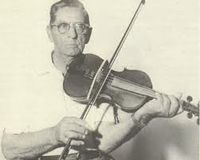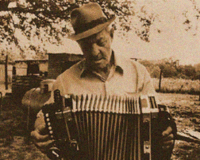Annotation:One-Step des Chameaux: Difference between revisions
No edit summary |
m (Text replacement - "garamond, serif" to "sans-serif") |
||
| (2 intermediate revisions by one other user not shown) | |||
| Line 1: | Line 1: | ||
=='''Back to [[{{BASEPAGENAME}}]]'''== | =='''Back to [[{{BASEPAGENAME}}]]'''== | ||
---- | ---- | ||
<p><font face=" | <p><font face="sans-serif" size="4"> | ||
'''ONE-STEP DES CHAMEAUX''' (Chameaux's One-Step). Cajun, One-Step. D Major. Standard tuning (fiddle). One part. Raymond Francois (1990) notes that Chameaux is a family name around Basile, Louisiana. | '''ONE-STEP DES CHAMEAUX''' (Chameaux's One-Step). AKA - "One Step a Chaumont." Cajun, One-Step (2/4 time). D Major. Standard tuning (fiddle). One part. Raymond Francois (1990) notes that Chameaux is a family name around Basile, Louisiana. The tune was recorded by white fiddler Dennis McGee and black accordionist Amédé Ardoin in New Orleans in November, 1930. The pair would play for dances in both white and black communities. | ||
<br> | <br> | ||
<br> | <br> | ||
</font></p> | </font></p> | ||
<p><font face=" | <p><font face="sans-serif" size="4"> | ||
[[File:mcgee2.jpg|200px|thumb|left|Dennis McGee]][[File:amede.gif|200px|thumb|right|Amédé Ardoin]] | [[File:mcgee2.jpg|200px|thumb|left|Dennis McGee]][[File:amede.gif|200px|thumb|right|Amédé Ardoin]] | ||
''Source for notated version'': | ''Source for notated version'': Dennis McGee and Amédé Ardoin (Eunice, La.) [Francois]. | ||
<br> | <br> | ||
<br> | <br> | ||
</font></p> | </font></p> | ||
<p><font face=" | <p><font face="sans-serif" size="4"> | ||
''Printed sources'': Francois ('''Yé Yaille Chère!'''), 1990; pp. 65-67. | ''Printed sources'': Francois ('''Yé Yaille Chère!'''), 1990; pp. 65-67. Greenblatt ('''Cajun Fiddle Book''') 1985; p. 25 (as "One Step a Chaumont"). | ||
<br> | <br> | ||
<br> | <br> | ||
</font></p> | </font></p> | ||
<p><font face=" | <p><font face="sans-serif" size="4"> | ||
''Recorded sources'': <font color=teal>Old Timey Records OT-108, Amede Ardoin & Dennis McGee.</font> | ''Recorded sources'': <font color=teal>Brunswick 559 (78 RPM), Amede Ardoin & Dennis McGee (1930). Old Timey Records OT-108, Amede Ardoin & Dennis McGee. Tompkins Square Records, "Mama, I'll Be Long Gone : The Complete Recordings of Amede Ardoin, 1929-1934" (2011). </font> | ||
<br> | |||
<br> | |||
</font></p> | |||
<p><font face="sans-serif" size="4"> | |||
See also listing at:<br> | |||
Hear Amédé Ardoin's recording on youtube.com [https://www.youtube.com/watch?v=sD8aRgvizmM]<br> | |||
</font></p> | </font></p> | ||
<br> | <br> | ||
Latest revision as of 15:32, 6 May 2019
Back to One-Step des Chameaux
ONE-STEP DES CHAMEAUX (Chameaux's One-Step). AKA - "One Step a Chaumont." Cajun, One-Step (2/4 time). D Major. Standard tuning (fiddle). One part. Raymond Francois (1990) notes that Chameaux is a family name around Basile, Louisiana. The tune was recorded by white fiddler Dennis McGee and black accordionist Amédé Ardoin in New Orleans in November, 1930. The pair would play for dances in both white and black communities.


Source for notated version: Dennis McGee and Amédé Ardoin (Eunice, La.) [Francois].
Printed sources: Francois (Yé Yaille Chère!), 1990; pp. 65-67. Greenblatt (Cajun Fiddle Book) 1985; p. 25 (as "One Step a Chaumont").
Recorded sources: Brunswick 559 (78 RPM), Amede Ardoin & Dennis McGee (1930). Old Timey Records OT-108, Amede Ardoin & Dennis McGee. Tompkins Square Records, "Mama, I'll Be Long Gone : The Complete Recordings of Amede Ardoin, 1929-1934" (2011).
See also listing at:
Hear Amédé Ardoin's recording on youtube.com [1]
